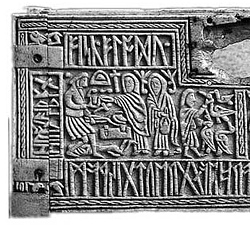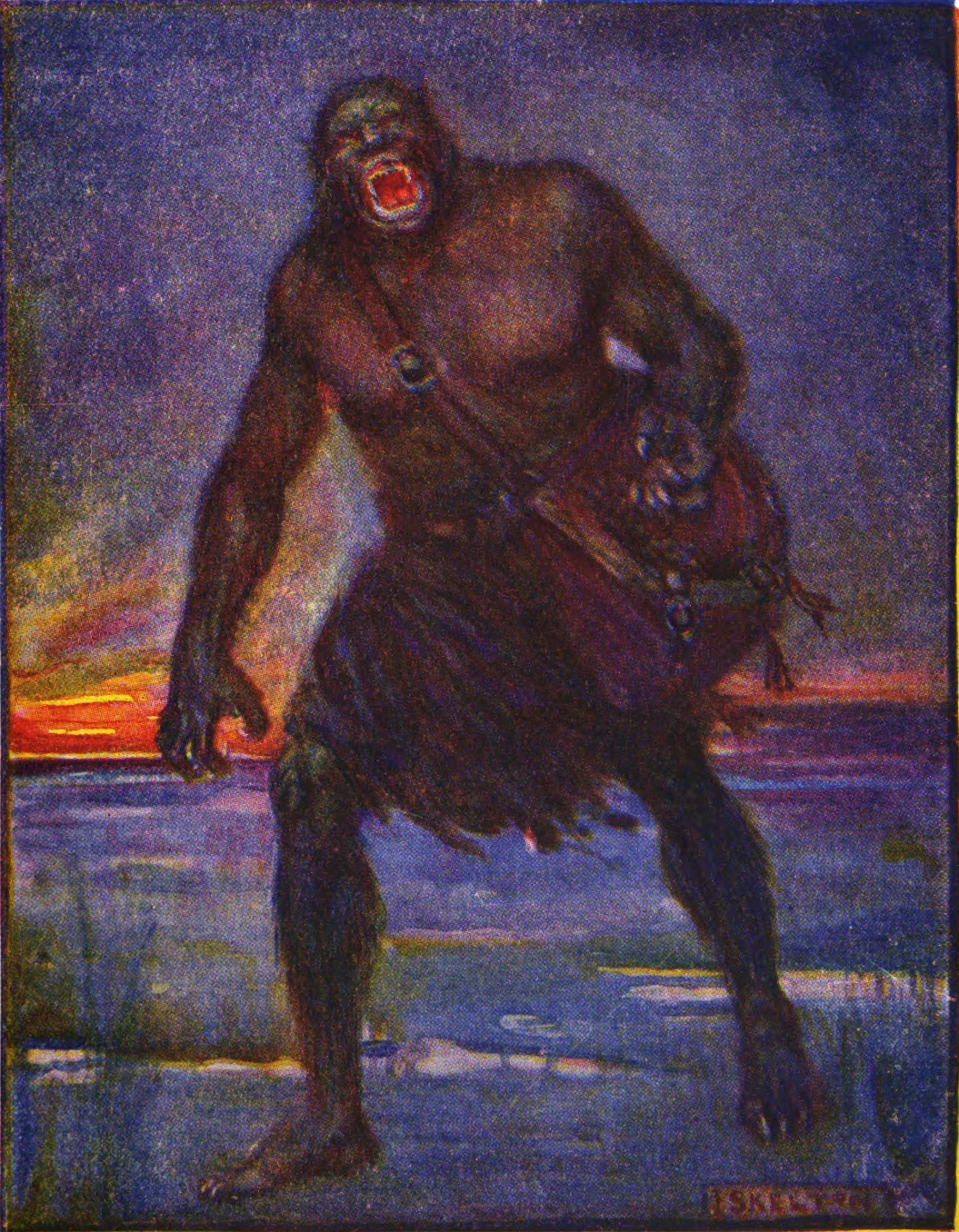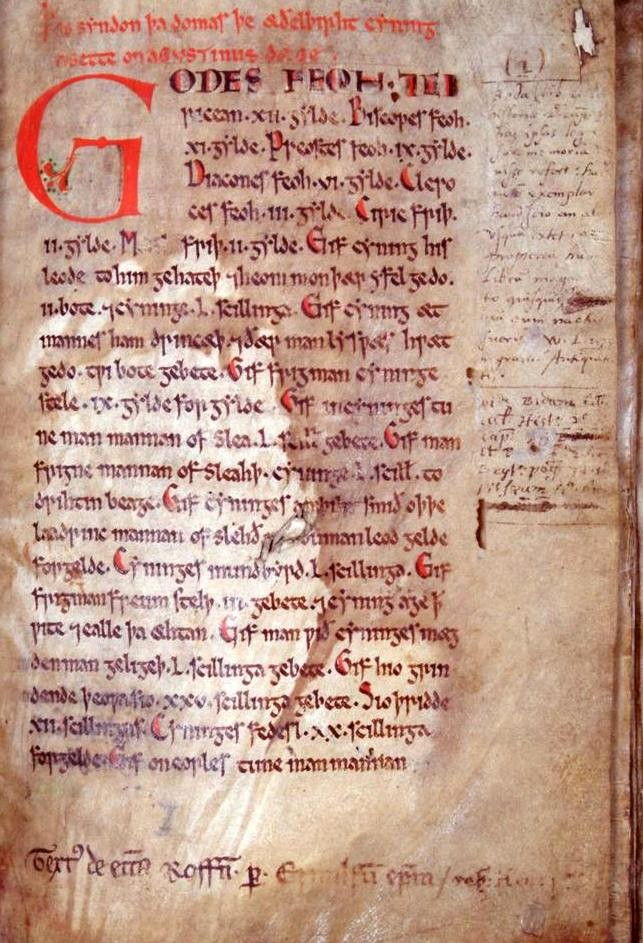|
Beot
A is Old English for a ritualized boast, vow, threat, or promise. Clark Hall, John R. ''A Concise Anglo-Saxon Dictionary''. Cambridge University Press, 1960, p. 42. The principle of a ''bēot'' is to proclaim one's acceptance of a seemingly impossible challenge in order to gain tremendous glory for actually accomplishing it. Anglo-Saxon warriors would usually deliver ''bēot''s in the mead hall the night before a military engagement or during the battle itself. For example, a typical warrior may boast that he will be the first to strike a blow in a battle, that he would claim a renowned sword from an enemy warrior as spoil of battle, that he will slay a particular monster that has been wreaking havoc on a town or village, and so on. ''Bēot''s were usually accompanied by grand stories of one's past glorious deeds. Although other cultures and times might disdain boasting as a sign of arrogance, or sinful pride, the pagan Anglo-Saxons highly regarded such behaviour as a positive sig ... [...More Info...] [...Related Items...] OR: [Wikipedia] [Google] [Baidu] |
Boast
Boasting or bragging is speaking with excessive pride and self-satisfaction about one's achievements, possessions, or abilities. Boasting occurs when someone feels a sense of satisfaction or when someone feels that whatever occurred proves their superiority and is recounting accomplishments so that others will feel admiration or envy. Individuals construct an image of themselves, a personal identity, and present themselves in a manner that is consistent with that image. Theodore Millon theorized that in self-presentation, individuals seek to balance boasting against discrediting themselves with excessive self-promotion or being caught blatantly misrepresenting themselves. Studies show that people often have a limited ability to perceive how their efforts at self-presentation are actually impacting their acceptance and likeability by others. Forms of bragging Although a brag can be as straightforward as a simple claim to riches or greatness, it often assumes a variety of more ... [...More Info...] [...Related Items...] OR: [Wikipedia] [Google] [Baidu] |
Weregild
Weregild (also spelled wergild, wergeld (in archaic/historical usage of English), weregeld, etc.), also known as man price (blood money), was a precept in some archaic legal codes whereby a monetary value was established for a person's life, to be paid as a fine or as compensatory damages to the person's family if that person was killed or injured by another. Overview A weregild was a defined value placed on every man graded according to rank, used as a basis of a fine or compensation for murder, disablement, injury (or certain other serious crimes) against that person. It was assessed from the guilty party, payable as restitution to the victim's family. The weregild was codified, for example, under Frankish Salic Code. Weregild payment was an important legal mechanism in early Germanic society; the other common form of legal reparation at this time was blood revenge. The payment was typically made to the family or to the clan. Similar to the way a payment was made to family, ... [...More Info...] [...Related Items...] OR: [Wikipedia] [Google] [Baidu] |
Wyrd
Wyrd is a concept in Anglo-Saxon culture roughly corresponding to fate or personal destiny. The word is ancestral to Modern English ''weird'', whose meaning has drifted towards an adjectival use with a more general sense of "supernatural" or "uncanny", or simply "unexpected". The cognate term to ''wyrd'' in Old Norse is , with a similar meaning, but also personified as a deity: Urðr (anglicized as ), one of the Norns in Norse mythology. The word also appears in the name of the well where the Norns meet, Urðarbrunnr. Etymology The Old English term derives from a Proto-Germanic term . ''Wyrd'' has cognates in Old Saxon , Old High German , Old Norse , Dutch (to become), and German . The Proto-Indo-European root is meaning 'to twist', which is related to Latin ''vertere'' 'turning, rotating', and in Proto-Germanic is with a meaning 'to come to pass, to become, to be due'. The same root is also found in , with the notion of 'origin' or ' worth' both in the sense of 'connotati ... [...More Info...] [...Related Items...] OR: [Wikipedia] [Google] [Baidu] |
Old English
Old English (, ), or Anglo-Saxon, is the earliest recorded form of the English language, spoken in England and southern and eastern Scotland in the early Middle Ages. It was brought to Great Britain by Anglo-Saxon settlement of Britain, Anglo-Saxon settlers in the mid-5th century, and the first Old English literature, Old English literary works date from the mid-7th century. After the Norman conquest of 1066, English was replaced, for a time, by Anglo-Norman language, Anglo-Norman (a langues d'oïl, relative of French) as the language of the upper classes. This is regarded as marking the end of the Old English era, since during this period the English language was heavily influenced by Anglo-Norman, developing into a phase known now as Middle English in England and Early Scots in Scotland. Old English developed from a set of Anglo-Frisian languages, Anglo-Frisian or Ingvaeonic dialects originally spoken by Germanic peoples, Germanic tribes traditionally known as the Angles, Sa ... [...More Info...] [...Related Items...] OR: [Wikipedia] [Google] [Baidu] |
John Richard Clark Hall
John Richard Clark Hall (1855 – 6 August 1931) was a British scholar of Old English, and a barrister. In his professional life, Hall worked as a clerk at the Local Government Board in Whitehall. Admitted to Gray's Inn in 1881 and called to the bar in 1896, Hall became principal clerk two years later. Hall's ''A Concise Anglo-Saxon Dictionary'' became a widely used work upon its 1894 publication, and after multiple revisions remains in print as of 2021. His 1901 prose translation of ''Beowulf''—the tenth in English, known simply as "Clark Hall"—became "the standard trot to , and was still the canonical introduction to the poem into the 1960s; several of the later editions included a prefatory essay by J. R. R. Tolkien. Hall's other work on ''Beowulf'' included a metrical translation in 1914, and the translation and collection of Knut Stjerna's Swedish papers on the poem into the 1912 work ''Essays on Questions Connected with the Old English Poem of Beowulf''. In the final ... [...More Info...] [...Related Items...] OR: [Wikipedia] [Google] [Baidu] |
Anglo-Saxon
The Anglo-Saxons were a Cultural identity, cultural group who inhabited England in the Early Middle Ages. They traced their origins to settlers who came to Britain from mainland Europe in the 5th century. However, the ethnogenesis of the Anglo-Saxons happened within Britain, and the identity was not merely imported. Anglo-Saxon identity arose from interaction between incoming groups from several Germanic peoples, Germanic tribes, both amongst themselves, and with Celtic Britons, indigenous Britons. Many of the natives, over time, adopted Anglo-Saxon culture and language and were assimilated. The Anglo-Saxons established the concept, and the Kingdom of England, Kingdom, of England, and though the modern English language owes somewhat less than 26% of its words to their language, this includes the vast majority of words used in everyday speech. Historically, the Anglo-Saxon period denotes the period in Britain between about 450 and 1066, after Anglo-Saxon settlement of Britain, th ... [...More Info...] [...Related Items...] OR: [Wikipedia] [Google] [Baidu] |
Mead Hall
Among the early Germanic peoples, a mead hall or feasting hall was a large building with a single room intended to receive guests and serve as a center of community social life. From the fifth century to the Early Middle Ages such a building was the residence of a lord or king and his retainers. These structures were also where lords could formally receive visitors and where the community would gather to socialize, allowing lords to oversee the social activity of their subjects. Etymology The old name of such halls may have been ''sal/salr'' and thus be present in old place names such as "Uppsala". The meaning has been preserved in German ''Saal'', Dutch ''zaal'', Frisian ''seal'', Icelandic ''salur'' , Swedish, Norwegian and Danish ''sal'', Lithuanian ''salė'', Finnish ''sali'', Estonian ''saal'', Izhorian ''saali'', Hungarian ''szállás'', French ''salle'', Italian/Polish/Portuguese/Spanish/Serbo-Croatian ''sala'' and Russian ''зал'' (zal), (all meaning "hall" or "large room ... [...More Info...] [...Related Items...] OR: [Wikipedia] [Google] [Baidu] |
Anglo-Saxon Paganism
Anglo-Saxon paganism, sometimes termed Anglo-Saxon heathenism, Anglo-Saxon pre-Christian religion, or Anglo-Saxon traditional religion, refers to the religious beliefs and practices followed by the Anglo-Saxons between the 5th and 8th centuries AD, during the initial period of Early Medieval England. A variant of Germanic paganism found across much of north-western Europe, it encompassed a heterogeneous variety of beliefs and cultic practices, with much regional variation. Developing from the earlier Iron Age religion of continental northern Europe, it was introduced to Britain following the Anglo-Saxon migration in the mid 5th century, and remained the dominant belief system in England until the Christianisation of its kingdoms between the 7th and 8th centuries, with some aspects gradually blending into folklore. The pejorative terms ''paganism'' and ''heathenism'' were first applied to this religion by Christian Anglo-Saxons, and it does not appear that these pagans had a nam ... [...More Info...] [...Related Items...] OR: [Wikipedia] [Google] [Baidu] |
Beowulf
''Beowulf'' (; ang, Bēowulf ) is an Old English epic poem in the tradition of Germanic heroic legend consisting of 3,182 alliterative lines. It is one of the most important and most often translated works of Old English literature. The date of composition is a matter of contention among scholars; the only certain dating is for the manuscript, which was produced between 975 and 1025. Scholars call the anonymous author the "''Beowulf'' poet". The story is set in pagan Scandinavia in the 6th century. Beowulf, a hero of the Geats, comes to the aid of Hrothgar, the king of the Danes, whose mead hall in Heorot has been under attack by the monster Grendel. After Beowulf slays him, Grendel's mother attacks the hall and is then defeated. Victorious, Beowulf goes home to Geatland and becomes king of the Geats. Fifty years later, Beowulf defeats a dragon, but is mortally wounded in the battle. After his death, his attendants cremate his body and erect a tower on a headland in ... [...More Info...] [...Related Items...] OR: [Wikipedia] [Google] [Baidu] |
Grendel
Grendel is a character in the Anglo-Saxon epic poem '' Beowulf'' (700–1000). He is one of the poem's three antagonists (along with his mother and the dragon), all aligned in opposition against the protagonist Beowulf. Grendel is feared by all in Heorot but Beowulf. A descendant of Cain, Grendel is described as "a creature of darkness, exiled from happiness and accursed of God, the destroyer and devourer of our human kind". He is usually depicted as a monster or a giant, although his status as a monster, giant, or other form of supernatural being is not clearly described in the poem and thus remains the subject of scholarly debate. The character of Grendel and his role in the story of ''Beowulf'' have been subject to numerous reinterpretations and re-imaginings. Story Grendel is a character in the poem ''Beowulf,'' preserved in the ''Nowell Codex''. Grendel, being cursed as the descendant of the Biblical Cain, is "harrowed" by the sounds of singing that come every night ... [...More Info...] [...Related Items...] OR: [Wikipedia] [Google] [Baidu] |
Middle English
Middle English (abbreviated to ME) is a form of the English language that was spoken after the Norman conquest of 1066, until the late 15th century. The English language underwent distinct variations and developments following the Old English period. Scholarly opinion varies, but the ''Oxford English Dictionary'' specifies the period when Middle English was spoken as being from 1150 to 1500. This stage of the development of the English language roughly followed the High to the Late Middle Ages. Middle English saw significant changes to its vocabulary, grammar, pronunciation, and orthography. Writing conventions during the Middle English period varied widely. Examples of writing from this period that have survived show extensive regional variation. The more standardized Old English language became fragmented, localized, and was, for the most part, being improvised. By the end of the period (about 1470) and aided by the invention of the printing press by Johannes Gutenberg in 14 ... [...More Info...] [...Related Items...] OR: [Wikipedia] [Google] [Baidu] |
Anglo-Saxon Law
Anglo-Saxon law (Old English ''ǣ'', later ''lagu'' "law"; dōm "decree, judgment") is a body of written rules and customs that were in place during the Anglo-Saxon period in England, before the Norman conquest. This body of law, along with early Medieval Scandinavian law and Germanic law, descended from a family of ancient Germanic custom and legal thought. However, Anglo-Saxon law codes are distinct from other early Germanic legal statements—known as the ''leges barbarorum'', in part because they were written in Old English instead of in Latin. The laws of the Anglo-Saxons were the second in medieval Western Europe after those of the Irish to be expressed in a language other than Latin. Overview Early Germanic law Inked records of early Germanic law (''leges barbarorum'') were, in many ways, the product of Roman influence. Throughout the early middle ages, as various " Teutonic", or Germanic, tribes on the continent came into closer and more peaceful contact with the high ... [...More Info...] [...Related Items...] OR: [Wikipedia] [Google] [Baidu] |







